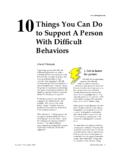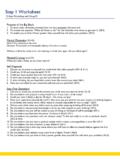Transcription of Mid-Season Training - Michael Brandwein
1 This is apdf printout TopicsbyMichael Brandweinfor CampStaff Training (Please seePart One below) Leadership Team / Supervisor Training (Please seePart Two below) Mid-Season Training (Please see Part Three below)Please contact Michael at 847-940-9820 or One: Training for StaffMichael can come to your camp to train your staff and supervisoryteam on site. He does Training forbig and small camps of every can also share costs by inviting other camps to bring their staffsand participate, either at your location or a larger location that isconvenient for everyone. What follows are some sample presentationtopics eachtraining is tailored to your specific needs and usuallycombine elements from several different topic Great Skills for Life, Terrific Behavior, & DevelopingSelf-EsteemBUILDING BETTER CHILDREN.
2 How to Teach Campers Good Choices & Outstanding Life SkillsIt s one thing to identify qualities and assets (the current buzz word) that young people need for success, but what s usually missing are rock solid ways to actually teachthese thingsduring the camp enthusiastically endorsed and used bycamp, recreation,education and youthdevelopment professionals throughout North America andis packed with specificand practical techniquesstaffwill be able to use immediatelyto teach life skills,enhance self-esteem, and deal with behavior in more positive and confident ways, what to say and do toteach cooperation, caring, responsibility,respect, persistence, patience, independence, and moreoconquering the biggest barrier to positive self-image: moving kids to Group Four othe key secret todevelopingresilientyoung people: how to make positiveself-concepts that really stickomaking praise credible and effectiveoincreasing positive communication to develop warmer, more Positive System to Teach & Motivate Great BehaviorAn energetic, exciting presentation of practical and effective techniques thatyou can use right away to teach young people outstanding behavior and recognizes that great qualities can be learned, andshows you in four warm and logical steps how to teach those qualities andmake success accessible to all young people.
3 It cuts through some surprisingbut common misconceptions about developing self-esteem and demonstratesspecific methods to lead young people to improve their own self-image andconfidence. Skills include:ohow to identify what you want young people to do and thencommunicate these expectations in a warm, motivating, andencouraging way;ospecific, step-by-step techniques to teach the most criticallifeskills,including: making good choices cooperation, teamwork, working well with others self-esteem, confidence, and independence friendship, sensitivity, and trust problem solving enthusiasm and energy excellent communication skills accepting and exercising responsibility thinking, reasoning, studying, organizing creativity patience and persistence flexibility and management of stress leadership of self and othersosix techniques to provide praise that is more credible and more effectivein teaching great behavior.
4 The dangers of ineffective responses andhow to eliminate through the tension, frustration, and friction often present whenmanaging behaviororediscovering the joys of leading and teaching young people--regenerating the excitement of knowing we can make important andimmediate differences in the lives of young peopleLEADING THE LITTLER ONES:Terrific Ways to Develop Self-Esteem, Responsibility, and Confidence inYoungCampersWorking with our younger ones (about 10 and under) at day camp or residentcamp requires special care and loads of great, easy-to-usetechniques to giveour young camperssuccessso they ll develop strong life skills andfeel great about themselves and their experiences in our programsand wantto come back again and again. This session includes highly effective ways todevelop strong, warm relationships with young kids,get and hold their attention,and build their cooperation, responsibility and respect for themselves and UNDESIRED BEHAVIOR IN POSITIVEWAYS WHY DON T YOU BEHAVE?
5 ! :The KEY SYSTEM Solution to Handling Negative BehaviorWhile Teaching Positive ChoicesDealing with bad behavior does NOT have to be exasperating. In fact, whenproperly done it is an outstanding opportunity for terrific teaching of positivelife skills. To be successful, we don t want theory or impractical, general approaches we need to know what tosayand what todo. Michael s KEYSYSTEMis a proven,practical, warm, and consistent set of very specifictechniques to immediately teach children how to make better choices whileguiding them away from undesired behavior, including fighting, grabbing, put-downs, whining, non-cooperation, talking back, and other inappropriate and problem four clear steps, you will learn to confidently handle even the most difficultbehaviors and how to get young people to accept more responsibility for theirconduct.
6 TheKEY SYSTEMhas been widely acclaimed not only for itseffectiveness, but for the fast-paced, fun way in which you will learn the skills,which include:ofour reasons why young people often do not listen to adults and thefour essential skills that restore credibility, consistency, and trustoten steps to doom: the exact ineffective phrases to eliminate in ourwork with kidsothe two big secrets to changing the precisely what to say and do to replaceinappropriate behavior with better choicesocalmly handling resistance and how to respond confidently to over adozen of the most common come-backs that young people use when adults speak to them about bad behaviorothe statements to make to young people to support their efforts tochange, set positive expectations, and develop positive relationshipswith even the most frequently misbehaving youth I VE TOLD YOU A THOUSAND TIMES!
7 : How to be Calm, Confident, & Consistent When Handling UndesiredBehavior Did I say NO?! Sure you did, but do they care? If you ve ever wondered in frustration, Why don t these kids listen to me? this session is for you. Whymust we tell some young people five or more times, but others only once? Whydo children behave one way in front of some adults, but another way with others?Teaching children to make good choices requires credibility and trust. Learnspecific techniques to establish that relationship. This session demonstratesexactly what credible adults do andsay, including:o"no means know" how clearly understanding what is and is notacceptable helps us tomean what we say and say what we meanobeing consistent and firm without losing control and without being mean"oteaching children to be responsibleoreducing the stress of leading and teaching children andestablishing a calm, effective environment for learning good lifeskills and choicesTEACHING RESPECT & RESPONSIBILITYDUMPING THE D S:How to Stop Put-Downs, Bullying, Taunting, & Teasing While Creating aSafe & Respectful Environment for Learning & GrowthOne of the key conditions required to assure successful education and youthdevelopment is safety not just physical, but emotional.
8 When anxiety goes up,learningand the willingness to participatego development researchreveals that adults often believe most young people feel basically safe, yet theyouth themselves report session presents specific and practicaltools and techniques. Past participants have used these skillswith successthroughout the and Canadain schools, camps, and other methodsteach young people increased respect while reducing put-downsand other negative behavior. This is not theory it s a hands-on skills sessionthat demonstratespreciselywhat to say and do to handle these undesiredbehaviors pre K-12 and how to help young peopletake more responsibility for theirpeer environment while learningto handle disagreement and conflict withouthurtingthe feelings of to Teach Responsibility, Problem-Solving, & Other Great Skills toCampers & StaffGood thinking is teachable, and this session demonstrates specific and practicaltechniques, materials, and activities that we can use to train staff and which staffcan use tohelpcampershave success inan increasingly challenging world,including.
9 The three-step Doing the method for solving problems, thesecret to muscular brains, problem-solving language, taking more personalresponsibility, and is an outstanding environment to stretch kid s brains. While school tends to focus most onwhatwe want youth to learn, camphas the time, tools, and setting that allows us to focus even more onhowto session presents exactly what to say anddo to help campers solve problemsand take more responsibility with calmness and confidence to better prepare themfor success in PROFESSIONALISM,MOTIVATION, & TEAM BUILDING YES, IT S FUN BUT IT S A REAL SolidSolutions to IncreaseStaff Professionalism and ResponsibilityThis sessionusespowerful techniquesto get staff to take this fun job seriously andact learn.
10 To respect and take care of themselves and others why it's important to ask for help and how todo so calmly and confidently how great of a difference they make in the lives of others the importance of acting as a role modeland how to do it understandingand working withthe expectations of parents how to be a responsible staff member and team player developing a positive relationship with supervisors, even when they are ourpeers and friends dealing with conflict through effective communication and handling the diverseviews and experiences which staff bring to camp and moreIMPROV TO IMPROVE:Fast & Fun Activities to Teach & Learn Leadership, Creativity, andTeamworkTheseterrific improv-based games and activities successfully teach creativity,team-building, leadership, communication, and they've experiencedthem, staff are shown how tousethem with campers, too!









